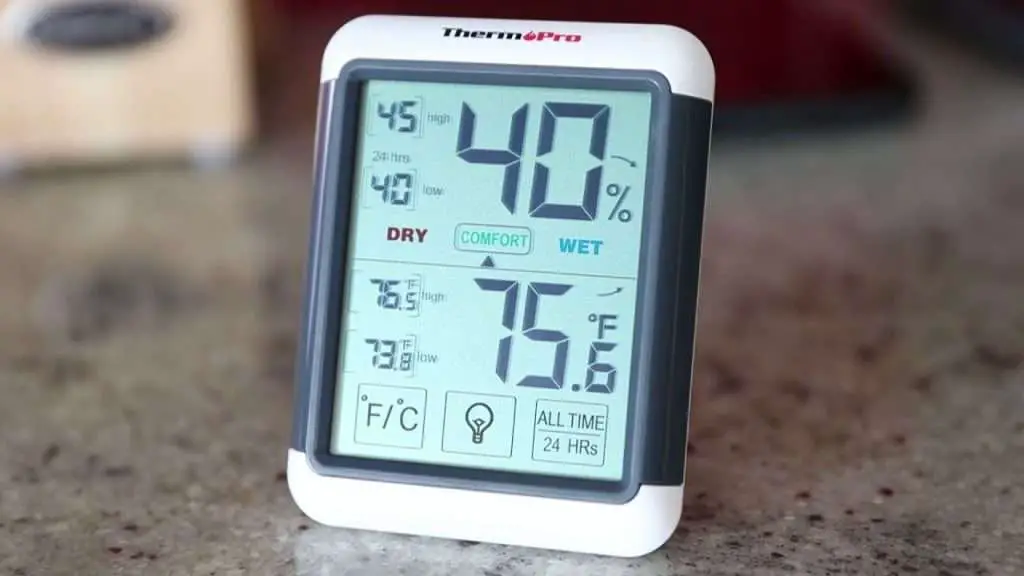- You are here:
- Home »
- Blog »
- Dehumidifiers »
- Is There A Dehumidifier That Does Not Produce Heat?
Is There A Dehumidifier That Does Not Produce Heat?

A dehumidifier is an electronic device that removes humidity. To achieve this, air is sucked into the dehumidifier where it is processed.
It is this process as well as the heat produced by moving parts that causes dehumidifiers to produce heat.
We’ll explain whether or not this is an issue and whether it is possible to remove this heat.
The Short Answer
Dehumidifiers naturally create heat when they run. This is usually a small amount and should be barely noticeable. Depending on the size of the room and running duration, you can expect a temperature rise of a few degrees.
How Dehumidifiers Work
Dehumidifiers work by sucking air in through a fan. This warm air is then cooled to remove moisture. This water is collected inside the internal water tank. Dry air is then release back into the room.
Do All Dehumidifiers Produce Heat?
The simple answer is yes.
As air is drawn into the dehumidifier, it runs past the coils, where the moisture starts condensing. The dehumidifier will then remove this energy as exhaust air which is warmer. This causes the slight temperature rise.
According to Energy Star, houses can cut their heating bills down by almost 20% during winter months when running two dehumidifiers.
The Difference Between an Air Conditioner and Dehumidifier
You know how it feels when you’re walking outside in the middle of summer and someone is blasting air conditioning?
AC draws in warm air to cool it. Air conditioners have a two-directional flow: they blow cold fresh air into your room and suck out warm air.
Dehumidifiers are simpler. They just get rid of humidity by releasing drier air into the atmosphere.
Types of Dehumidifiers
Higher capacity dehumidifiers are more energy-efficient as they dehumidifier faster. But there are two main types of dehumidifier, each removing moisture in a different way.
Refrigerant Dehumidifiers
Compressor or refrigerant dehumidifiers feature a fan that pulls air onto its cooling plate, where it condenses water. This water is removed, and dry air is returned to the atmosphere.
This type of dehumidifier works better in warmer environments and produces a very small amount of heat.
Desiccant Dehumidifiers
Unlike refrigerant dehumidifiers, desiccants absorb water from the air using silica crystals (often found in packs in a new bag or new items of electronics). As the warm, moist air enters the dehumidifier, it comes into contact with a silica wheel that absorbs and collects moisture.
These dehumidifiers are better for colder environments as the temperature doesn’t affect humidity reduction. They also produce far more heat than refrigerant dehumidifiers. This is because they intentionally heat up the air they process to reduce humidity.
Reducing Heat Production
The next question is whether we can reduce the amount of heat produced. The best way to do this is by reducing the running time of your dehumidifier. These tips will reduce the amount of time your dehumidifier is on:
- Try to increase the amount of natural light in the room. This will help reduce the moisture content in air, allowing your dehumidifier to switch off faster.
- Ensure that doors and windows are sealed. It’s essential to seal or tighten these up as external air is a source of humidity. You could have your dehumidifier running all day and night and still not entirely remove the moisture in the air due to humid air entering your house. Not only is this a waste of electricity but also inefficient and expensive.
- Running a fan will help to make the room feel cooler. It will also increase air flow which will increase the efficiency of your dehumidifier.
Final Verdict
Dehumidifiers are a worthwhile home appliance that provides a comfortable living space by reducing damp, mold and bacteria.
The only disadvantage of running a dehumidifier is a slight increase in temperature, so make sure you’re prepared to run the AC during summer to control temperatures and a fan to improve airflow.
Further Reading
About the Author Lets Remove Mold
If you're looking to buy a new dehumidifier then you're in the right place. Through years of HVAC and mold remediation experience, the team at letsremovemold.com are able to provide advice on the type of dehumidifier you need for your home.
